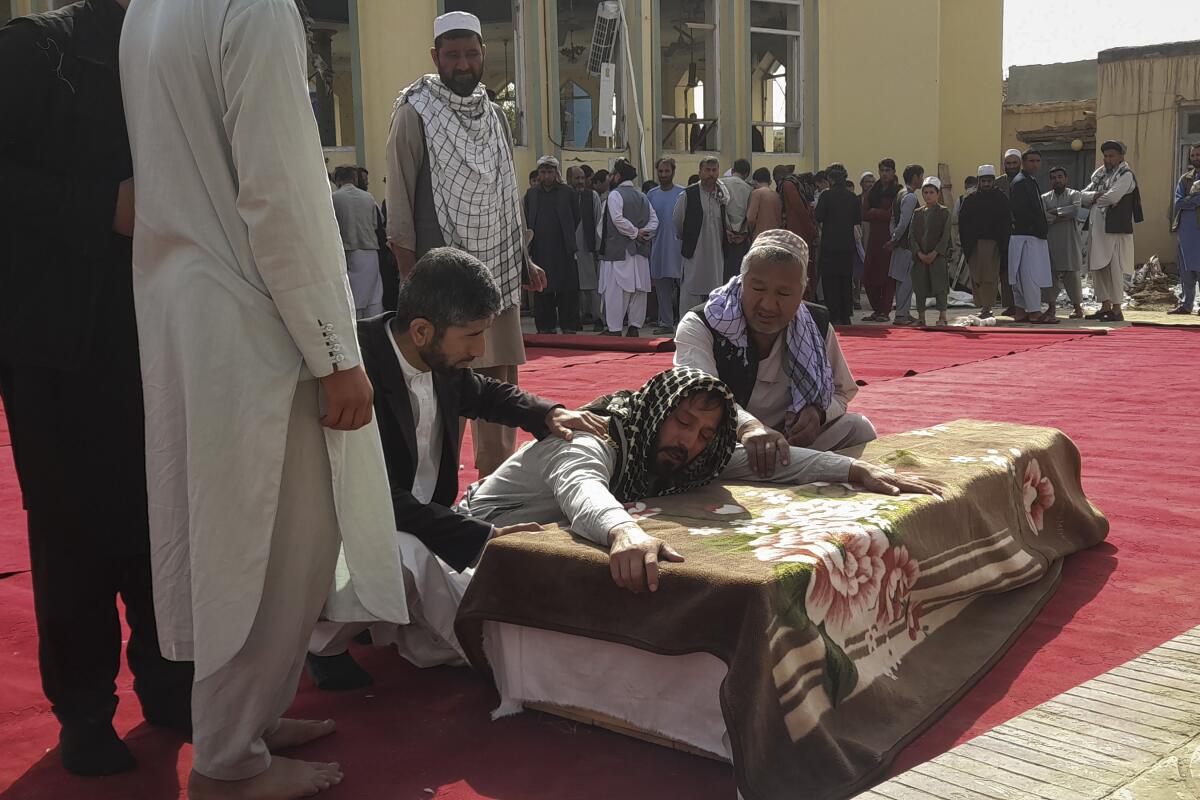Taliban says U.S. will provide humanitarian aid to Afghanistan

- Share via
ISLAMABAD, Pakistan — The U.S. has agreed to provide humanitarian aid to a desperately poor Afghanistan on the brink of an economic disaster, while refusing to give political recognition to the country’s new Taliban rulers, the Taliban said Sunday.
The statement came at the end of the first direct talks between the former foes since the chaotic withdrawal of U.S. troops at the end of August.
A U.S. statement was less definitive, saying only that the two sides “discussed the United States’ provision of robust humanitarian assistance, directly to the Afghan people.”
The Taliban said the talks held in Doha, Qatar, “went well,” with Washington freeing up humanitarian aid to Afghanistan after an agreement not to link such assistance to formal recognition of the Taliban.
The United States made it clear that the talks were in no way a preamble to recognition of the Taliban, who swept into power Aug. 15 after the U.S.-allied government collapsed.
They were hoping to win Fulbright scholarships. Then the Taliban took over, and the U.S. went silent
Afghans short-listed for the prestigious scholarship say they’ve been forgotten since the Taliban took power. Deadlines loom to apply to U.S. schools.
State Department spokesman Ned Price called the discussions “candid and professional,” with the U.S. side reiterating that the Taliban will be judged on its actions, not only its words.
“The U.S. delegation focused on security and terrorism concerns and safe passage for U.S. citizens, other foreign nationals and our Afghan partners, as well as on human rights, including the meaningful participation of women and girls in all aspects of Afghan society,” he said in a statement.
Taliban political spokesman Suhail Shaheen also told the Associated Press that the movement’s interim foreign minister assured the U.S. during the talks that the Taliban is committed to seeing that Afghan soil is not used by extremists to launch attacks against other countries.
On Saturday, however, the Taliban ruled out cooperation with Washington on containing the increasingly active Islamic State group in Afghanistan.
Islamic State, an enemy of the Taliban, has claimed responsibility for a number of recent attacks, including Friday’s suicide bombing that killed 46 minority Shiite Muslims. Washington considers Islamic State its greatest terrorist threat emanating from Afghanistan.
“We are able to tackle Daesh independently,” Shaheen said when asked whether the Taliban would work with the U.S. to contain the Islamic State affiliate. He used an Arabic acronym for the group.
Bill Roggio, a senior fellow at the Foundation for Defense of Democracies who tracks militant groups, agreed that the Taliban does not need Washington’s help to hunt down and destroy Afghanistan’s IS affiliate, known as the Islamic State in Khorasan Province, or ISKP.
The Taliban “fought 20 years to eject the U.S., and the last thing it needs is the return of the U.S. It also doesn’t need U.S. help,” said Roggio, who also produces the foundation’s Long War Journal. “The Taliban has to conduct the difficult and time-consuming task of rooting out ISKP cells and its limited infrastructure. It has all the knowledge and tools it needs to do it.”
The United Nations hosted a high-level donors conference to drum up emergency funds for Afghanistan after the Taliban’s takeover of the country.
The Islamic State affiliate doesn’t have the advantage of havens in Pakistan and Iran that the Taliban had in its fight against the United States, Roggio said. However, he warned that the Taliban’s longtime support for Al Qaeda makes it unreliable as a counterterrorism partner with the United States.
The Taliban gave refuge to Al Qaeda before it carried out the Sept. 11 attacks. That prompted the 2001 U.S. invasion of Afghanistan that drove the Taliban from power.
“It is insane for the U.S. to think the Taliban can be a reliable counterterrorism partner, given the Taliban’s enduring support for Al Qaeda,” Roggio said.
During the meeting, U.S. officials were expected to press the Taliban to allow Americans and others to leave Afghanistan. In their statement, the Taliban said without elaborating that they would “facilitate principled movement of foreign nationals.”
More to Read
Sign up for Essential California
The most important California stories and recommendations in your inbox every morning.
You may occasionally receive promotional content from the Los Angeles Times.











